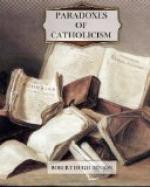But, for all that, it is riding that thy King cometh to thee.... He will not relinquish His inalienable claim and He will have nothing essential left out. He has His royal escort, even though a ragged one; He will have His spearmen, even though their spears be only of palm; He will have His heralds to proclaim Him, however much the devout Pharisees may be offended by their proclamation; He will ride into His own Royal City, even though that City casts Him out, and He will have His Coronation, even though it be with thorns. So, too, the Catholic Church advances through the ages.
In merely human rights and personal matters again and again she will yield up all that she has, making, it may be, but one protest for Justice’ sake and then no more. And she will urge her children to do the same. If the world will let her have no jewels, then she will put glass beads in her monstrance, and for marble she will use plaster, and tinsel for gold.
But she will have her Procession and insist upon her Royalty. It may seem as poor and as mean and as tawdry as the entrance of Christ Himself through the royal gate; for she will yield up all that the world demands of her, so long as her Divine Right itself remains intact. She will issue her orders, though few be found to obey them; she will cast out from her the rebellious who question her authority, and cleanse her Temple Courts even though with a scourge at which men mock. She will give up all that is merely human, if the world will have it so, and will resist not evil if it merely concerns herself. But there is one thing which she will not renounce, one thing she will claim, even with violence and “intransigeance,” and that is the Royalty with which God Himself has crowned her.
X
THE SEVEN WORDS
THE “THREE HOURS”
INTRODUCTION
The value, to the worshippers, of the Devotion of the Three Hours’ Agony is in proportion to the degree in which they understand that they are watching not so much the tragedy of nineteen hundred years ago as the tragedy of their own lives and times. Merely to dwell on the Death of Christ on Calvary would scarcely avail them more than to study the details of the assassination of Caesar at the foot of Pompey’s statue. Such considerations might indeed be interesting, exciting, and even a little instructive or inspiring; but they could not be better than this, and they might be no better than morbid and harmful.
The Death of Christ, however, is unique because it is, so to say, universal. It is more than the crowning horror of all murderous histories; it is more even than the type of all the outrages that men have ever committed against God. For it is just the very enactment, upon the historical stage of the world, of those repeated interior tragedies that take place in every soul that rejects or insults Him; since the God whom we crucify within is the same God that was once crucified without. There is not an exterior detail in the Gospel which may not be interiorly repeated in the spiritual life of a sinner; the process recorded by the Evangelists must be more or less identical with the process of all apostasy from God.




